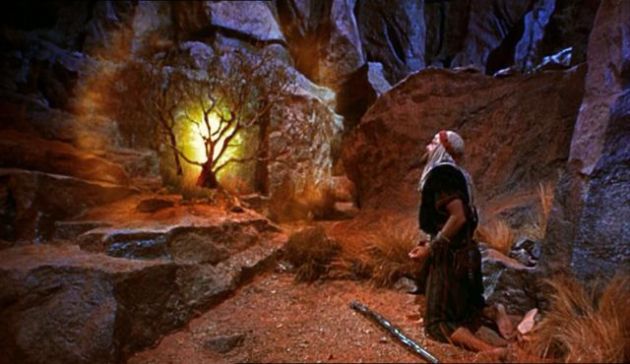Nemo has hit, and it appears to have lived up to its hype. We still have power here at Creighton House, but I know it’s spotty around Falmouth. Lots of our friends around town have lost power and heat, and we’ve invited some over to our place to share the warmth on this blustery day. So it may be that you won’t or can’t read this post soon; or probably, you wouldn’t get to it for a few days anyway. But whatever the case, to all the Barnabas Bible Challengers: stay warm and safe!
I wanted to say another word about the ‘begats’, because we concluded today’s reading from Genesis with another flood of them. The bible – and the Old Testament in particular – is generally understood to be the story of the people Israel and their relationship with the God of Israel. The people who are writing this book are writing it to give an account of themselves. But they’re also giving an account of the people around them. That is, they can’t very well tell their own story without making some implications about the stories of others.
For example: think of the complicated and not altogether wholesome tale of Esau and Jacob that we’ve been following. Esau is Isaac’s firstborn, he is better loved by Isaac, but he gives up his birthright to the younger Jacob and is tricked out of his blessing by Jacob too. In other words, Esau was Isaac’s (and so Abraham’s) heir, but due to some carelessness of Esau’s and some craftiness of Jacob’s, that inheritance is transferred to Jacob, the second child, the late-comer.
Esau, we’re told in the last bevy of begats, is also called Edom, and gave birth to all the children of Edom. So here’s where it gets interesting for us. Remember, all these stories were written after Israel had come to power, after they had established their kingdom. When they came into the land of Canaan it wasn’t just an empty wilderness, it was peopled by all sort of other tribes that the people of Israel had to conquer in order to establish their kingdom. And once they were finished, they wrote these stories down. Edom was the name of one of the neighboring kingdoms. (The word “Edom” means “red” in Hebrew; recall Esau’s red hair.) Edom was a rival nation, right next door, in fact; they were one of the peoples the Israelites failed at first to conquer. Eventually, Israel did defeat Edom in war, and Edom became a vassal of Israel.
 Isaac blessing Jacob, Govert Flinck, 1638
Isaac blessing Jacob, Govert Flinck, 1638
Notice how this follows the tale we’ve just heard: Edom/Esau had the land first; Israel/Jacob takes it eventually. What the bible story adds is justification: it may have been through trickery or force, but the blessing of the land belongs to Israel/Jacob, even if Edom/Esau had it first. The land belongs rightly, the story says, to Israel, so their conquest of Edom is justified.
When this part of the bible was written and redacted (redacted is a fancy word that sort of means ‘edited’; scholars believe that many different stories were collated and collected and cohered into single story and scholars call that process redaction), Israel had just concluded an age of conflict. Scholars believe they had gradually inhabited the land, assimilating themselves into other communities and assimilating other communities into their own. But as certain tribes consolidated power, they began to war and dominate each other. And as power finally consolidated around the kingdoms of Judah and Israel, these two kingdoms began to think and talk about the peoples they had conquered, and why they might have been justified in conquering them. When we get to the books of Kings and the books of Samuel, we’ll hear accounts of these conquests. But the justification for those conquests is all here in Genesis, the coming conquest is all foreshadowed here.
Take the name of anybody who does anything dastardly or disgusting or disreputable in the book of Genesis, look at that person’s offspring, and it’s a pretty safe bet those peoples will be conquered by the kingdom of Israel when we get to Kings and Samuel. Remember Ham who peers at his father Noah’s nakedness, and whom Noah curses for it? Well, Ham becomes the father of all the nations of Canaan, the land which Israel conquers. And this ancient curse justifies the taking of their land. Remember Moab and Ammon, the sons of Lot who were born of incest between Lot and his daughters? The Moabites and Ammonites were two tribes conquered by the Israelites later on. And this story gives us the ancient justification. Edom may have been born to Isaac first, but the land’s not his, it’s Israel’s. So Israel is justified in taking it by force. And then perhaps an example you already caught: Ishmael, whom Muslims would later claim as lineage, the firstborn but banished son of Abraham.

Sarah leading Hagar to Abraham, Matthias Stom, c. 1638
These begats are boring to us because we don’t hear these cues, we don’t realize the backstory. But for the people who were reading and listening to these stories when they first started being told, it all made perfect sense. Of course we slaughtered Moab; they’ve been cursed since their founding. Certainly we conquered Canaan; Noah said they would be subject to us. And yes, Edom may have been here first, but being first isn’t everything. The land belongs to Israel.
The relationship between Israel and the land of Canaan is long and complex and continues to have great significance even in our world today. Listen to the news for more than a few minutes if you don’t believe me. So I’m not taking a position here on whether and to what degree Israel has rights to the land of Canaan. If I’m feeling courageous perhaps I’ll state some of my positions on these things in a future post. But I think that I should at least call attention to the fact that these stories, sacred as they are, are human stories too, told by humans. If we read closely and with some background knowledge, we will quickly recognize all the typical traits of the human – the self-aggrandizement, the self-justification, the denial of culpability and the pride of power – popping up between the lines of this text at least as often as we come to discern the mystery of God there.
Happy reading,
Matt
 The Capture of Christ, Caravaggio, 1598
The Capture of Christ, Caravaggio, 1598




